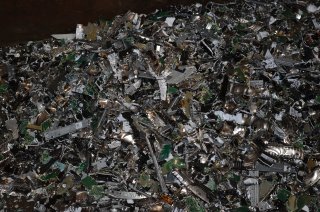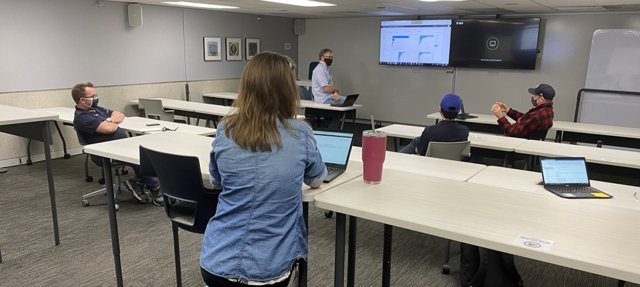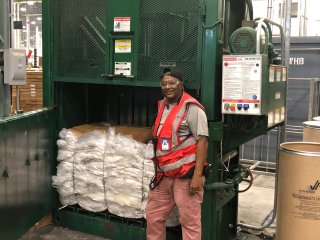2021 WasteWise Regional Award Winners
Recognition was a key element of WasteWise. The 2021 WasteWise regional award winners shared details and quotes about their waste prevention and diversion activities with EPA. Read about their accomplishments and how they achieved them.
Disclaimer: EPA does not endorse these entities or their services.
On this page:
- Region 2:
- Region 5:
- Region 6
- Region 7
- Region 9
Region 2
Ombligo, Inc.
Brooklyn, New York
Ombligo, Inc. minimizes the environmental impact of end-of-life management of information technology (IT) hardware by selling affordable refurbished IT hardware. Ombligo responsibly recycles any equipment that cannot be resold. All equipment marked for recycling is tracked by serial number through R2-certified downstream vendors. The IT company has diverted tons of IT hardware and some hazardous materials from landfills. Ombligo carefully inspects each unit to ensure that it only recycles parts with no resale value or other potential use. For example, the company has repurposed server chassis as table bases and has upcycled voltage regulator modules for business card holders.

Ombligo’s sustainability mission extends beyond its warehouse walls. In 2020, the company’s recycling operations for cardboard, mixed paper, wood, and other recyclables reduced carbon emissions by 35.2 MTCO2E when compared to landfilling. This is a 17 percent increase from Ombligo’s 2019 figure and is equivalent to conserving 3,971 gallons of gas or taking 7.6 passenger cars off the road for one year.
The IT company’s other accomplishments in 2020 included passing surveillance audits for all certifications: ISO 9001, ISO 14001, ISO 45001, and R2 Responsible Recycling. In 2020, Ombligo’s greatest challenge was COVID-19. The company learned to adapt to drastically changing market conditions and quickly moved the vast majority of its resale business to online sales.
ECOS: New Jersey
Parsippany, New Jersey
ECOS has been a pioneer in manufacturing environmentally friendly household and commercial cleaning products since 1967. Over the last 50 years, sustainability has played a key role in the business, and ECOS sees every aspect of the business as an opportunity to reduce environmental impact. Since 2015, ECOS manufacturing facilities across the nation have been certified Platinum Zero Waste for diverting over 95 percent of their total waste from landfills. ECOS implements a zero waste policy in all departments companywide, which extends throughout the supply chain and consumers.
ECOS reduces waste through practices like source separation, going paperless where feasible, limiting personal printers at offices, composting, and requiring vendors to implement zero waste practices. The company reuses and repairs as many materials as possible and has established take-back systems with suppliers. In 2020, ECOS extended this take-back program to include returning packaging materials to partners in the supply chain, including empty pallets, drums, and totes used for raw materials and packaging supplies. These partners reuse these materials for future shipments to ECOS, rather than recycling or repurposing them on-site. ECOS also extensively educates employees about source separation of materials and the benefits of a circular economy.
In 2020, the Parsippany, New Jersey facility diverted 98.3 percent of its waste from landfills. It recycled over 127 tons of materials and reused or returned over 172 tons of material. The facility also donated 4.5 tons of unused or unmarketable products to local non-profit organizations. The zero waste efforts of rethinking, reducing, reusing, and recycling saved the New Jersey facility over $35,000 in waste disposal costs in 2020.
Despite current challenges in the recycling market and an increase in production resulting from increased demand for ECOS products during the COVID-19 pandemic, the company continued its zero waste and recycling training programs. ECOS adapted waste operations to achieve over 98.3 percent waste diversion at all four of its zero waste facilities.
Region 5
Kohl’s
Menomonee Falls, Wisconsin
Kohl’s is an omnichannel retailer with over 1,100 stores in 49 states. With such a large retail footprint, Kohl’s is in a unique position to make resounding impacts on the planet, especially in areas like waste management. Kohl’s believes that incorporating sustainable solutions in the way they do business will help to build better futures for families.
In 2020, Kohl’s achieved an 85 percent diversion rate through multiple initiatives, including plastic and cardboard recycling, paperless billing, and beauty product and fabric scrap repurposing. Kohl’s recycled over 110,000 tons of material, including more than four million pounds of plastic and 199 million pounds of cardboard. Waste diversion during 2020 was significantly lower than a typical year, because COVID-19 disruptions resulted in temporary building closures and reduced occupancy for much of the year. Other key 2020 accomplishments included:
- Kohl’s made it even easier for customers to cut back on their plastic waste by offering reusable bags for sale in all stores.
- As an active member of the How2Recycle label program, Kohl’s empowers customers to recycle their packaging correctly. 95 percent of shipping bags and boxes, 100 percent of in-store shopping bags, and 100 percent of exclusive shoe boxes now incorporate the label.
Kohl’s has been an active WasteWise partner since 2007 and has earned multiple WasteWise awards.
Steelcase
Grand Rapids, Michigan
In November 2020, Steelcase, a furniture manufacturer, implemented a new scrap team at its Kentwood facility. The team meets weekly to discuss scrap reduction opportunities at the plant. Representatives for each value stream work on waste reduction pilots that also help the company save money. A report system sends daily scrap to all leaders in the plant for added visibility. Alongside this initiative, Steelcase moved its scrap tracking system from a paper system to an online tracking data set, which allows for more accountability. These efforts have helped Steelcase stay on track with its 25 percent scrap reduction goal for fiscal year 2022.
At the Reynosa facility, Steelcase is implementing lean manufacturing principles and improving its use of raw materials. As Steelcase strives to reduce overall waste and scrap, some teams have taken it upon themselves to find alternatives to landfills. They have succeeded at diverting waste from landfills and finding economical reuse opportunities. The Reynosa facility found a vendor across the border in Texas that will reuse fabric scrap for stuffing punching bags. This also helps Steelcase reduce waste disposal costs, as the vendor does not charge for recycling.

At the Denver facility, Steelcase created a solution for the hardware and plastic bags left behind at receiving client installs. Previously, a highly visible orange bag hung in each truck so installers could see if small parts were included in the delivery. The bags were then discarded (typically landfilled) or returned to the Denver distribution center after client deliveries. The team proposed using returnable burlap bags and ran a pilot test to explore the option. The returnable solution was a success. The team then proposed making the reusable bags from in-house recycled scrap. The bags can be returned multiple times, saving the cost of purchasing new bags, as well as preventing plastic from going to landfills. Steelcase hopes to scale this idea to all distribution centers.
ECOS: Illinois
Addison, Illinois
ECOS has been a pioneer in manufacturing environmentally friendly household and commercial cleaning products since 1967. Over the last 50 years, sustainability has played a key role in the business, and ECOS sees every aspect of the business as an opportunity to reduce environmental impact. Since 2015, ECOS’ manufacturing facilities across the nation have been certified Platinum Zero Waste for diverting over 95 percent of their total waste from landfills. ECOS implements a zero waste policy in all their departments companywide, which extends throughout the supply chain and consumers.
ECOS reduces waste through practices like source separation, going paperless where feasible, limiting personal printers at offices, composting, and requiring vendors to implement zero waste practices. The company reuses and repairs as many materials as possible and has established take-back systems with suppliers. In 2020, ECOS extended this take-back program to include returning packaging materials to partners in the supply chain, including empty pallets, drums, and totes used for raw materials and packaging supplies. These partners reuse these materials for future shipments to ECOS, rather than recycling or repurposing them on-site. ECOS also extensively educates employees about source separation of materials and the benefits of a circular economy.
In 2020, the Addison, Illinois facility diverted 97.7 percent of its waste from landfills. It recycled over 228 tons of materials and reused or returned over 114 tons of material. It also donated 16 tons of unused or unmarketable product to local non-profit organizations. ECOS’ zero waste efforts of rethinking, reducing, reusing, and recycling saved the Illinois facility over $40,000 in waste disposal costs.
Despite current challenges in the recycling market and an increase in production resulting from increased demand for ECOS products during the COVID-19 pandemic, the company continued its zero waste and recycling training programs and adapted waste operations to maintain 95 percent waste diversion at all four of its zero waste facilities.
Region 6
Owens PLLC
DeSoto, Texas
Owens PLLC is a small law firm that continues to make an impact in protecting the environment. 2020 was obviously challenging for everyone. As Owens PLLC transitioned to deal with the COVID-19 pandemic, the company’s workflow changed dramatically. As such, Owens PLLC became even more efficient in its conservation efforts. The company saw an extreme decrease in its use of materials, including plastic, boxes, and paper supplies. Owens PLLC staff continue to work from home, and the company has transitioned many of its processes and paperwork to an electronic format, thereby saving resources. Some unexpected savings even occurred from paying bills online instead of using paper checks.
Virco Manufacturing Corporation
Conway, Arkansas
Since 1989, Virco Manufacturing Corporation has demonstrated its commitment to the environment while producing school and commercial furniture. In 1994, Virco joined the WasteWise program and began documenting its waste prevention, recycling, and diversion efforts. 2019 and 2020 were very challenging years for businesses across the United States; however, Virco’s Conway Division weathered the challenge by not closing and continuing normal manufacturing processes and recycling efforts while implementing practices to protect employees and others. Virco’s recycling department, comprised of four employees, had no interruption in service and continued to find markets for recyclables and partner with businesses and schools. The Take-Back Program, which started in 2002 with the purpose of taking back, recycling, and repurposing furniture manufactured by the company or its competitors, flourished in 2019 as Virco donated 400 tons of furniture to a local flea market, financially distressed school districts, an addiction recovery home, and Goodwill. In 2020, Virco sustained its efforts by donating 65 tons of furniture.
Virco also continued the Cash for Cardboard Program, which started in 1993 to help elementary school students attend space camp by collecting, recycling, and donating the proceeds from cardboard collection back to the school. The program continues to thrive and has expanded to include seven school districts, 34 schools, and four businesses. As of 2021, over $300,000 in proceeds from cardboard recycling have been disbursed to participating schools. Although material showed a slump in revenue, Virco continued to move recyclables through the system. During 2019 and 2020, Virco diverted over 6,400 tons of potential waste from the landfill. Waste management policies, community involvement, and an environmentally focused corporate mindset are essential for a waste prevention and recycling program’s success.
Daikin Texas Technology Park
Waller, Texas
Complete with an office building, a manufacturing plant, a cafeteria, a wellness center, engineering labs, training dojos, and wastewater treatment plants, Daikin Texas Technology Park (DTTP) is much like a small city. DTTP receives an enormous amount of packaging material, which makes Daikin’s commitment to achieving zero waste to landfill even more critical.
In 2019, DTTP and Quietflex, a Daikin group company, implemented a returnable container system. The companies began packaging and delivering supplies in returnable metal containers. This project reduced 46.5 tons of wood pallets and 63 tons of cardboard in 2019, and 180 tons of wood pallets and 120 tons of cardboard in 2020.

Also in 2019, DTTP created four recycling technician positions to reduce contamination of its recycling streams, increase the volume of recyclables, and improve recycling rebates. Because of these employees, film plastics recycling increased from 0 to 100 tons in 2019, and DTTP recycled 174 tons of film plastic in 2020. DTTP’s waste management efforts saved $599,735 in 2020.
One of DTTP’s most significant accomplishments involves expanding wood waste recycling. Historically, DTTP struggled to find a recycling vendor that could handle the volume of pallets it needs to recycle. Fortunately, DTTP identified two vendor partners who were able to help. Consequently, DTTP diverted 1,491 tons of wood waste from landfills, and in 2020, that total increased to 2,542 tons. The most significant accomplishment in 2020 was the 74 percent increase in plastic film recycling.
DTTP’s greatest challenge to recycling and waste diversion is contamination. To solve this, the company put tremendous effort into signage and employee communication. However, DTTP saw a greater reduction in contamination rates once it transitioned from recycling compactors to balers. The company has since become more intentional about container selection, policy development, and making the process easier for internal customers.
Region 7
Northern Natural Gas
Omaha, Nebraska
Northern Natural Gas owns and operates the largest interstate natural gas pipeline system in the United States, which stretches across 11 states, from the Permian Basin in Texas to Michigan’s Upper Peninsula. Northern’s waste management program promotes waste minimization, reduction of landfill disposal, and recycling, and requires annual training for over 900 employees. The program emphasizes recycling by requiring operations personnel to log monthly recycling efforts.
In 2020, Northern diverted more than 2.7 million pounds of material from landfills. This total includes large-scale construction projects that recycled more than 888 tons of scrap metal, as well as office settings that recycled 12.8 tons of paper. Field operations’ recycling efforts prevented the disposal of hazardous or potentially hazardous materials. Employees reused or recycled approximately 80,000 gallons of used oil, 17,823 gallons of glycol, and 4.88 tons of batteries. Northern Natural Gas also participates in a solvent continued use program that prevented the disposal of 8,070 gallons of used solvent, which would have been characterized as hazardous waste. The company also recycles aluminum cans, cardboard, e-waste, plastic, and newspapers.
Companywide initiatives have decreased the need to recycle by reducing or eliminating waste. By replacing fluorescent bulbs with longer lasting LEDs, Northern Natural Gas decreased the number of bulbs recycled from 3,884 pounds in 2019 to 1,659 pounds in 2020. Water dispensers have been installed at many locations to decrease the number of plastic bottles used. These are examples of Northern’s commitment to the Environmental RESPECT business principle in all aspects of operations: Responsibility, Efficiency, Stewardship, Performance, Evaluation, Communication, and Training. Northern continually challenges employees to improve and not just maintain ecological efforts.
Region 9
ECOS: California
Cypress, California
“The realities of climate change and our impact on the earth can no longer be ignored. For over 50 years, our mission has been to protect the health of people, pets, and the planet, and zero waste manufacturing is an important way we’re achieving that mission. Shoppers tell us it’s important to them, too—they want to buy products from companies that are doing more to reduce their impact on the environment. I hope our success will inspire other companies to reduce waste in their operations to help protect our beautiful, shared planet.” — Kelly Vlahakis-Hanks, President and CEO
ECOS has been a pioneer in manufacturing environmentally friendly household and commercial cleaning products since 1967. Over the last 50 years, sustainability has played a key role in the business, and ECOS sees every aspect of the business as an opportunity to reduce environmental impact. Since 2015, ECOS manufacturing facilities across the nation have been TRUE-certified Platinum Zero Waste for diverting over 95 percent of their total waste from landfills. ECOS implements a zero waste policy in all departments company-wide, which extends throughout the supply chain and consumers.
ECOS reduces waste through practices like source separation, going paperless where feasible, limiting personal printers at offices, composting, and requiring vendors to implement zero waste practices. The company reuses and repairs as many materials as possible and has established take-back systems with suppliers. In 2020, ECOS extended this take-back program to include returning packaging materials to partners in the supply chain, including empty pallets, drums, and totes used for raw materials and packaging supplies. These partners reuse these materials for future shipments to ECOS, rather than recycling or repurposing them on-site. ECOS also extensively educates employees about source separation of materials and the benefits of a circular economy.
In 2020, the Cypress, California facility diverted 97.8 percent of its waste from landfills. It recycled over 106 tons of materials, and reused or returned over 100 tons of material. It also donated 4.9 tons of unused or unmarketable product to local non-profit organizations. ECOS’ zero waste efforts of rethinking, reducing, reusing, and recycling saved the California facility over $18,000 in waste disposal costs.
Despite current challenges in the recycling market and an uptick in production resulting from increased demand for ECOS products during the COVID-19 pandemic, the company continued its zero waste and recycling training programs and adapted waste operations to maintain 95 percent waste diversion at all four of its zero waste facilities.
